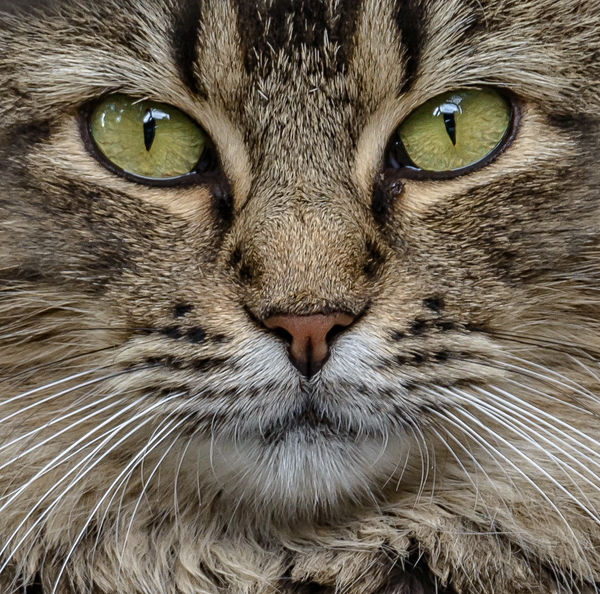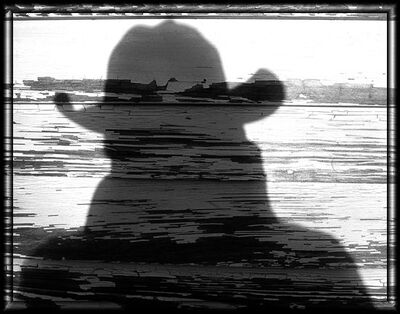Noisy new lens
Dec 14, 2016 08:23:12 #
Dec 14, 2016 09:41:21 #
catchlight..
Loc: Wisconsin USA- Halden Norway
Sometimes we get things wrong. This is worth reading Re: Effective shutter speed for "IS"... from DP Reviews Nathan Yan
Image stabilization works at all shutter speed ranges. Don't think of it as something that actually affects your shutter speed, but simply a device that balances out the shaking.
Now, for a long shutter speed, your IS system has to balance it out for longer, which is harder to do. For fast shutter speeds, your IS needs to balance it out for a shorter time, and it may be so short that there won't be blur anyway. So IS primarily helps at slower shutter speeds, although see below.
Under the same idea, when using telephoto lenses with long photo lengths, there tends to be more shake, and the IS system has to work harder to balance the greater shake. With wide lenses, there is less shake, and possibly so little that there won't be blur anyway.
So IS will always work no matter what shutter speed and focal length. However, it's main benefits are for long telephoto lenses and long shutter speeds. Some would argue that it's really not needed for wide lenses or fast shutter speeds (although I personally disagree with this).
Shutter speed "values" are all the same - they're not related to IS. You may be referring to the "effectiveness" of IS systems - they usually measure them in "stops", a 3-stop IS system claims to allow you to shoot at a shutter speed 3 stops slower than you would have without IS, and maintain the same level of blur. What this actually means depends on the individual photographer. Someone who has shaky hands can normally shoot only at 1/1000s without blur (extreme example), so 3 stops would allow him to shoot at 1/125s without blur. Another photographer with rock steady hands would be able to hold his camera steady at 1/8s, so 3 stops allows him to shoot at 1s.
Image stabilization works at all shutter speed ranges. Don't think of it as something that actually affects your shutter speed, but simply a device that balances out the shaking.
Now, for a long shutter speed, your IS system has to balance it out for longer, which is harder to do. For fast shutter speeds, your IS needs to balance it out for a shorter time, and it may be so short that there won't be blur anyway. So IS primarily helps at slower shutter speeds, although see below.
Under the same idea, when using telephoto lenses with long photo lengths, there tends to be more shake, and the IS system has to work harder to balance the greater shake. With wide lenses, there is less shake, and possibly so little that there won't be blur anyway.
So IS will always work no matter what shutter speed and focal length. However, it's main benefits are for long telephoto lenses and long shutter speeds. Some would argue that it's really not needed for wide lenses or fast shutter speeds (although I personally disagree with this).
Shutter speed "values" are all the same - they're not related to IS. You may be referring to the "effectiveness" of IS systems - they usually measure them in "stops", a 3-stop IS system claims to allow you to shoot at a shutter speed 3 stops slower than you would have without IS, and maintain the same level of blur. What this actually means depends on the individual photographer. Someone who has shaky hands can normally shoot only at 1/1000s without blur (extreme example), so 3 stops would allow him to shoot at 1/125s without blur. Another photographer with rock steady hands would be able to hold his camera steady at 1/8s, so 3 stops allows him to shoot at 1s.
Dec 14, 2016 11:57:52 #
vininnj2u wrote:
Others say they hear it on "their" lens.
It's not right to hear a lens hunting unless you are moving your lens from close subjects to far subjects and it is adjusting the focus. That would be normal. But if you are holding as steady as possible and you hear it hunting, thats not right.
Dec 14, 2016 12:22:02 #
vininnj2u wrote:
I purchased a 100mm IS USM macro lens. Used it today and I hear a clicking sound while focusing. Seems to be hunting for focus. I called Canon and they heard it also on my speaker phone. He said I have a one year warranty and to use it until I can get it to Canon to be checked out. I have read up on it, and other people have said they hear the same noise. DOES ANYONE HAVE THIS LENS, that would like to comment about it. Do you hear the noise??? Thanks. Vince
While most lenses make at least a tiny bit of noise, one that can be heard over the phone sounds unreasonable, most likely something wrong. Why one would choose to have AF on a macro lens would be another topic altogether (I would certainly never use it)!
Dec 14, 2016 12:26:23 #
catchlight..
Loc: Wisconsin USA- Halden Norway
You never said what method you were in, single point focus, multi point or an auto focus mode? A good tip is to put the lens on another camera body and compare the focus. Low light is also problematic for focus hunting.
Dec 14, 2016 12:29:10 #
speters wrote:
While most lenses make at least a tiny bit of noise, one that can be heard over the phone sounds unreasonable, most likely something wrong. Why one would choose to have AF on a macro lens would be another topic altogether (I would certainly never use it)!
One uses AF on a macro all the time. Foolish to not have it and use it. Shots of flowers, moving things and as an excellent 100mm prime lens. Very stupid not to have AF on the macro lens.
Dec 14, 2016 12:37:28 #
mwsilvers
Loc: Central New Jersey
vininnj2u wrote:
I purchased a 100mm IS USM macro lens. Used it today and I hear a clicking sound while focusing. Seems to be hunting for focus. I called Canon and they heard it also on my speaker phone. He said I have a one year warranty and to use it until I can get it to Canon to be checked out. I have read up on it, and other people have said they hear the same noise. DOES ANYONE HAVE THIS LENS, that would like to comment about it. Do you hear the noise??? Thanks. Vince
Try turning the IS off and see if the noise stops.
Dec 14, 2016 12:49:38 #
I also have this lens and it does not make any noises, I would send it in for repair asap...
Dec 14, 2016 13:18:11 #
catchlight.. wrote:
Sometimes we get things wrong. This is worth readi... (show quote)
Catchlight - I couldn't agree more - we do get things wrong sometimes. And it seems that Nathan Yan falls into that category.
His supporting data for how IS works at all shutter speeds is lacking, and I am being kind.
Clearly, IS response time and it's ability to move things in the lens has a physical limit - sensor sensitivity, inertia of lens moving elements, lag times etc. So logically speaking I doubt that IS is functional at 1/8000 of a second. By the same token I really wonder if it is functional at 1/1000 sec.
But I do not have the equipment or detailed knowledge to back this up.
But Thom Hogan and Nasim Mansurov probably do. And they are not students or academics writing opinions about stuff in 2007 like Mr. Yan.
Here is Hogan's analysis -
http://www.bythom.com/nikon-vr.htm (2010 - he observed that image acuity diminished when stabilization on Nikon cameras was left on at shutter speeds shorter than 1/500)
and Mansurov's
https://photographylife.com/proof-that-vibration-reduction-should-first-be-stabilized
Both agree that beyond a certain shutter speed not only does keeping stabilization on not help matters, it may actually hurt image sharpness. Hogan suggests that it is an absolute shutter speed limit of 1/500-1/1000, and Mansurov suggests that it is related to the focal length, which takes into consideration image magnification, with the inverse of the focal length used as a practical limit for stabilization effectiveness.
The obvious thing to keep in mind is that as your shutter speed gets shorter, there is less of a need for stabilization, since your keeper rate will naturally improve with the faster shutter speeds - that is unless you drank a six pack of Red Bulls immediately prior to shooting hand-held.

I would say that Mr. Yan's advice is not the best, and certainly not worth reading, other than for historical value.
That being said, here is an image taken with a 600mm lens with IS turned on, hand-held at 1/25 (not a typo). The first is an extreme crop, the second is the uncropped version. I am a fan of stabilization, but it does have it's limits with respect to it's effectiveness, and I would never leave it on if I were using shutter speeds shorter than 1/500 second.
Dec 14, 2016 13:30:37 #
This lens should be on its way back to Canon. Clicks, grinding noises should not be heard inside a Canon "L" quality lens. If the lens makes these noises during focusing, it may become very serious very fast. If during IS it could be in one of the elements of the lens. If not sent in by your 1 year warranty period, you'll be charged for the repair. From Canon service you may even get a full replacement lens if it's that bad. I also own this lens, and use it rather frequently. It snaps to focus, and only makes a soft whirring noise when IS is engaged, and that is on all my Canon bodies, 5D Mark IV, 6D, 7D Mark II, 7D, and even my old 50D.
B
B
Dec 14, 2016 13:31:11 #
Dec 14, 2016 13:47:02 #
Gene51 wrote:
Catchlight - I couldn't agree more - we do get thi... (show quote)
I guess for most folks, myself included, IS when shooting at a speed inverse of the focal length provides no benefit. But I wonder if someone is a little shaky and that rule of thumb doesn't apply, would they see some improvement?
--
Dec 14, 2016 15:21:38 #
catchlight..
Loc: Wisconsin USA- Halden Norway
Nice Cat Gene. Thanks for the comments on IS. This article is current and has a lot of information if anyone is interested from a trusted source: https://www.bhphotovideo.com/explora/photography/tips-and-solutions/image-stabilization-when-use-it-and-when-turn-it
Dec 14, 2016 16:44:34 #
Once again thanks for all the info. I hope this topic helped others as well.
Dec 14, 2016 16:45:30 #
catchlight.. wrote:
Nice Cat Gene. Thanks for the comments on IS. This article is current and has a lot of information if anyone is interested from a trusted source: https://www.bhphotovideo.com/explora/photography/tips-and-solutions/image-stabilization-when-use-it-and-when-turn-it
Thanks on the cat! She is one of the ferals that I did TNR on (trap, neuter, return) 18 months ago. She had 6 kittens under my house in the spring of 2015. Her kittens were adopted out, she came back to me to convalesce for a bit, and decided to hang around. I have 4 ferals that I feed and shelter in the cold weather that are keeping my house rodent and vermin-free in return. I also have 4 insiders that live the good life.
It is a great article. I wish it would have covered the observation that even with newer smarter and more responsive IS systems, there can still be a loss of quality when using it at short shutter speeds. But it does answer a lot of the questions and clear away the misconceptions concerning IS. Thanks for posting that!
If you want to reply, then register here. Registration is free and your account is created instantly, so you can post right away.








